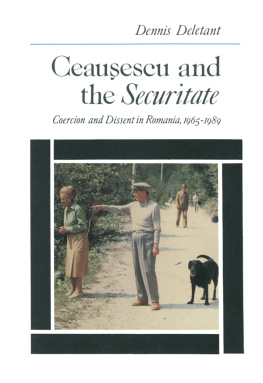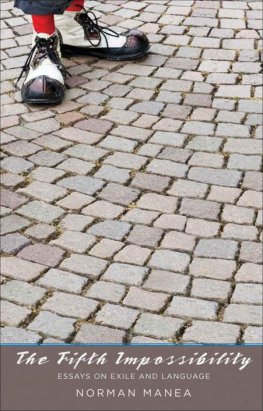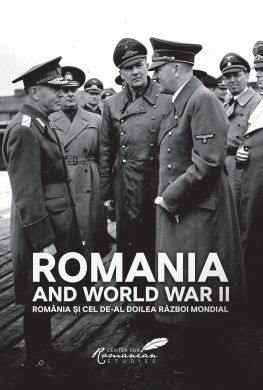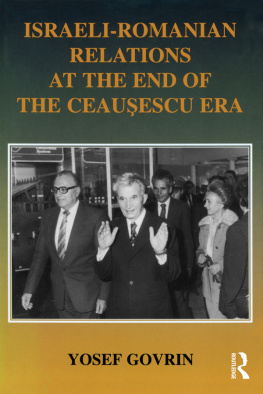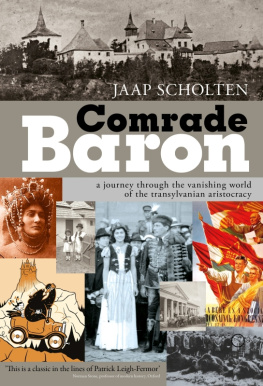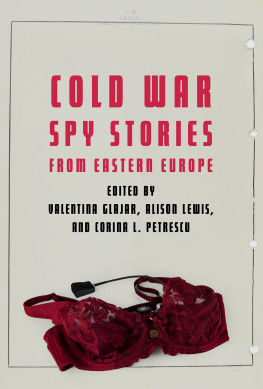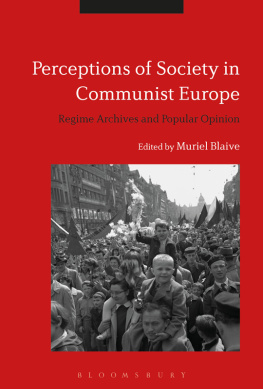CEAUESCU AND THE SECURITATE
DENNIS DELETANT
Ceauescu
and the
securitate
Coercion and Dissent
in Romania, 19651989

First published 1995 by M.E. Sharpe
Published 2015 by Routledge
2 Park Square, Milton Park, Abingdon, Oxon OX14 4RN
711 Third Avenue, New York, NY 10017, USA
Routledge is an imprint of the Taylor & Francis Group, an informa business
Copyright 1995 Taylor & Francis. All rights reserved.
No part of this book may be reprinted or reproduced or utilised in any form or by any electronic, mechanical, or other means, now known or hereafter invented, including photocopying and recording, or in any information storage or retrieval system, without permission in writing from the publishers.
Notices
No responsibility is assumed by the publisher for any injury and/or damage to persons or property as a matter of products liability, negligence or otherwise, or from any use of operation of any methods, products, instructions or ideas contained in the material herein.
Practitioners and researchers must always rely on their own experience and knowledge in evaluating and using any information, methods, compounds, or experiments described herein. In using such information or methods they should be mindful of their own safety and the safety of others, including parties for whom they have a professional responsibility.
Product or corporate names may be trademarks or registered trademarks, and are used only for identification and explanation without intent to infringe.
Library of Congress Cataloging-in-Publication Data
Deletant, Dennis, 1946
Ceauescu and the Securitate: coercion and dissent in Romania, 19651989 / by Dennis Deletant.
p. cm.
Includes bibliographical references (p. ) and index.
ISBN 1-56324-633-3 (alk. paper)
1. Romania. Securitatea. 2. Secret serviceRomania. 3. Political persecution Romania. 4. Ceauescu, Nicolae. 5. Romania Politics and government 1944-1989 I. Title.
HV8241.8.A45R634 1995
363.28309498 dc20 95-30768
CIP
ISBN 13: 9781563246333 (hbk)
This book owes much to Maurice Pearton, who throughout its writing has given encouragement and advice and has read the manuscript. Several Romanian friends, through their example of dignity and courage, have a prominent role in the book and they also helped me to reconstitute dates and events which are not recorded elsewhere. One or two do not wish to be named, but they know who they are: I wish to thank them. The names of others are in the public domain. They are Mariana Celac, Mircea Dinescu, Andrei Pleu, and Andrei Pippidi.
Invaluable assistance in my research into Romanian history has been given for over twenty years by erban Papacostea, Paul Cernovodeanu, Florin Constantiniu and Ion Chiper, all of the Nicolae Iorga Institute of History in Bucharest. Iai Ioan Caprou and Alexandru Zub have been staunch friends and colleagues for almost the same period of time. For aspects of Transylvanian history (and cuisine and humour), I am especially indebted to George Cipianu of the Institute of History in Cluj.
Over the years it has been my good fortune to meet many Romanians who have enriched my life with their friendship, conversation, practical help in times of difficulty and their determination to overcome the adversities of daily life under Ceauescu. Among them are Seta and Alexandru Ionescu, Alexandru and Mihaela Hodo in Bucharest and Virgil Stanciu and Sever Trifu in Cluj. Part of this book draws on the experience of contact with them.
My initial interest in Romania was encouraged by the late Eric Tappe, Emeritus Professor of Romanian Studies at the School of Slavonic and East European Studies of the University of London. It was he who supervised my studies in the Romanian language and literature and provided introductions to his wartime friends in Bucharest, one of whom, the late Professor Dan Simonescu, taught me most of what I know about early Romanian culture. Without the guidance given by both these gentlemen, I would not have had the linguistic and cultural background to develop my studies.
For many of the details of political history in the Communist period I am indebted in particular to the research of Mary Ellen Fischer, Michael Shafir and Vladimir Tismneanu. Alexandra Obreja, Christian Mititelu and Beverley Gray of the BBC Romanian Section have patiently put up with my request for archival material and, despite the pressures of broadcasting, have always been most willing to assist. The enormous contribution which the Section has made since the war to maintaining the morale of Romanians by dispelling the lies of the Ceauescu regime and by giving a voice, denied by the Communist authorities, to protest from within the country is exemplified in the pages of this book.
My greatest debt is to my wife, Andrea, and her parents, Micua and Andrei Caracostea. They have been a continual source of insights into the Romanian mentality. My parents-in-law, despite imprisonment and losing everything, are proof that one can retain dignity and humanity through courage and a sense of humour. It is to them, and to the thousands like them, that this book is dedicated.
November 1994 DENNIS DELETANT
CONTENTS
Chapters
An inescapable feature of life in Romania under Ceauescu was the ubiquity of the Securitate or the security police, known officially for much of the period as the Department of State Security (Departamentul Securitii Statului DSS) of the Ministry of the Interior. I realized as much from my first contact with the country in 1965 and that realisation was reinforced during many subsequent visits. My professional and personal involvement with Romania encompassed the entire duration of Ceauescus rule, from 1965 until 1989, and it was inevitable that my frequent visits and my contacts with historians and writers should attract the Securitates attention. In view of my experience of Romania, it was therefore always a source of frustration to me that the literature on Romanias history since the imposition of Communist rule in 1945 said little about the mechanism of terror which Stalin used in Romania to enforce his will and about the organisation of the Department of State Security. This omission was, at first glance, perhaps surprising, given the importance of the institutionalised terror practised by the Securitate in buttressing the Communist regime, first under Gheorghe Gheorghiu-Dej and then under his successor, Nicolae Ceauescu. Yet the structure and personnel of the body empowered to terrorise the population into acceptance of the legislation introduced to communise Romania, to arrest the 80,000 peasants who opposed the land reform of 1949, to imprison and torture the six Greek Catholic (Uniate) bishops and 600 priests who refused to accept union with the Romanian Orthodox Church in the winter of 1948 and, in Ceauescus time, to deport hundreds of miners from the Jiu Valley after their participation in the strike of August 1977, remained sketchy.
One might infer from this lack of information about the Securitate that as a political force, it was not significant; yet the very fact that Colonel General Alexandru Drghici, who was appointed Minister of the Interior in 1952, was one of Ceauescus rivals as successor to Gheorghiu-Dej in March 1965 shows the importance of the political platform offered by the Ministry in the 1950s and early 1960s. It was only by removing Drghici from his power base that Ceauescu was able to consolidate his own position as General Secretary of the Romanian Communist Party. The very fact that Ceauescus prime objective was to bring the Ministry of the Interior fully under Party and, ultimately, his own control was an indication of his priorities. This is not to suggest that the
Next page
